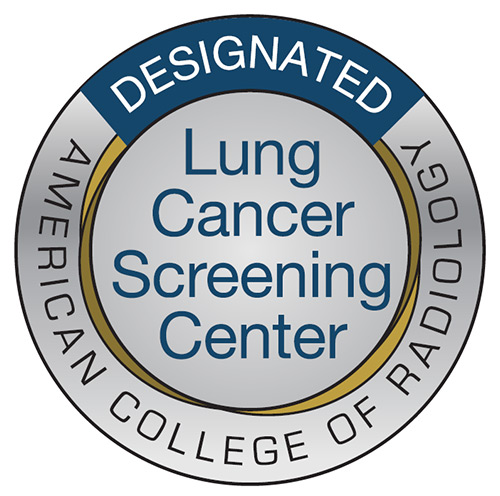Lung cancer is the leading cause of cancer death among men and women in the U.S. New treatments are improving outcomes for cancer patients, but caring for your lungs throughout your lifetime – even after a cancer diagnosis – is the first line of defense in the battle with lung cancer.
To provide the best treatment for lung and thoracic cancers, it is very important to understand the specific type of cancer and to learn if, and how far, the cancer has spread.
At Northeast Georgia Medical Center (NGMC), a multidisciplinary team of medical oncologists, radiation oncologists, surgeons, pulmonologists and professional clinicians identify and stage the cancer using the most advanced technology.
Diagnosing Lung Cancer
We offer the most advanced imaging techniques to ensure that your cancer is diagnosed and staged appropriately, enabling your care team to develop the most successful treatment plan. NGMC is designated as a Lung Cancer Screening Center by the American College of Radiology.
Lung Cancer Treatment
Lung Nodule Pathway Program
NGMC’s Lung Nodule Pathway Program is designed to shift diagnoses from late-stage to early-stage, significantly improving the chances of a cure.
Lung Cancer Surgery
Our advanced cardiothoracic surgeons offer everything from highly precise biopsies and diagnostics to minimally invasive robotic surgery to remove lung cancers. With nationally renowned surgeons on our team, you can rest assured that we offer the most advanced care options to provide better outcomes and lessened recovery times.
Radiation Therapy for Lung Cancer
Our Radiation Therapy department offers the latest, state-of-the-art treatment technologies including therapies which deliver maximum doses of radiation with a decreased risk of side effects.
Chemotherapy for Lung Cancer
Chemotherapy uses drugs to destroy cancer cells and tumors in the body. Depending on which type of cancer you have, you may have chemotherapy before or after surgery.
NGMC’s Cancer Services program offers a modern, comfortable infusion suite where patients can receive their chemotherapy treatments. Chemotherapy is also offered by our medical oncologists in their offices.
While receiving your treatment, you may want to visit with your family and friends who accompany you, read or watch television. Our care team will work to make you as comfortable as possible during your treatments.
Smoking Cessation Programs
Evidence demonstrates that smoking cessation improves the prognosis and all mortality causes up to 45% for people with cancer. We offer programs and support for our patients to quit smoking once and for all.
Lung Cancer Research
Northeast Georgia Medical Center actively participates in clinical trials to make the latest treatments available to our patients and to advance the treatment options available to patients around the world in defeating cancer. Learn more about lung and thoracic clinical trials that are currently offered at NGMC.
Cancer & Pulmonary Rehabilitation
We have specialized rehabilitation programs both for individuals living with chronic lung conditions and for those recovering from cancer treatment.
Support Services
For patients who may be struggling to navigate their diagnosis or even get to and from appointments to receive care, our Patient Navigation Program is here to help. Patient navigators guide patients through their cancer care journey, and they also help patients who need it access essentials like transportation, healthy food and more. Learn more about patient navigation.
Choose NGMC for Lung Cancer Treatment
Luckily, lung cancer is being caught and treated earlier and earlier, but a diagnosis can still be difficult regardless of how the cancer is staged. Northeast Georgia Medical Center offers leading lung cancer care throughout the region and some of the latest cancer-fighting technologies. Allowing patients to remain close to home, surrounded by friends and family, we follow nationally approved treatment guidelines and participate in clinical. Our dedication to patient support and education is seen every day through our compassionate care team, including patient navigators, nurses, and physicians.
For more information about cancer care at NGMC or to learn about support groups, please call 770-219-8815.


